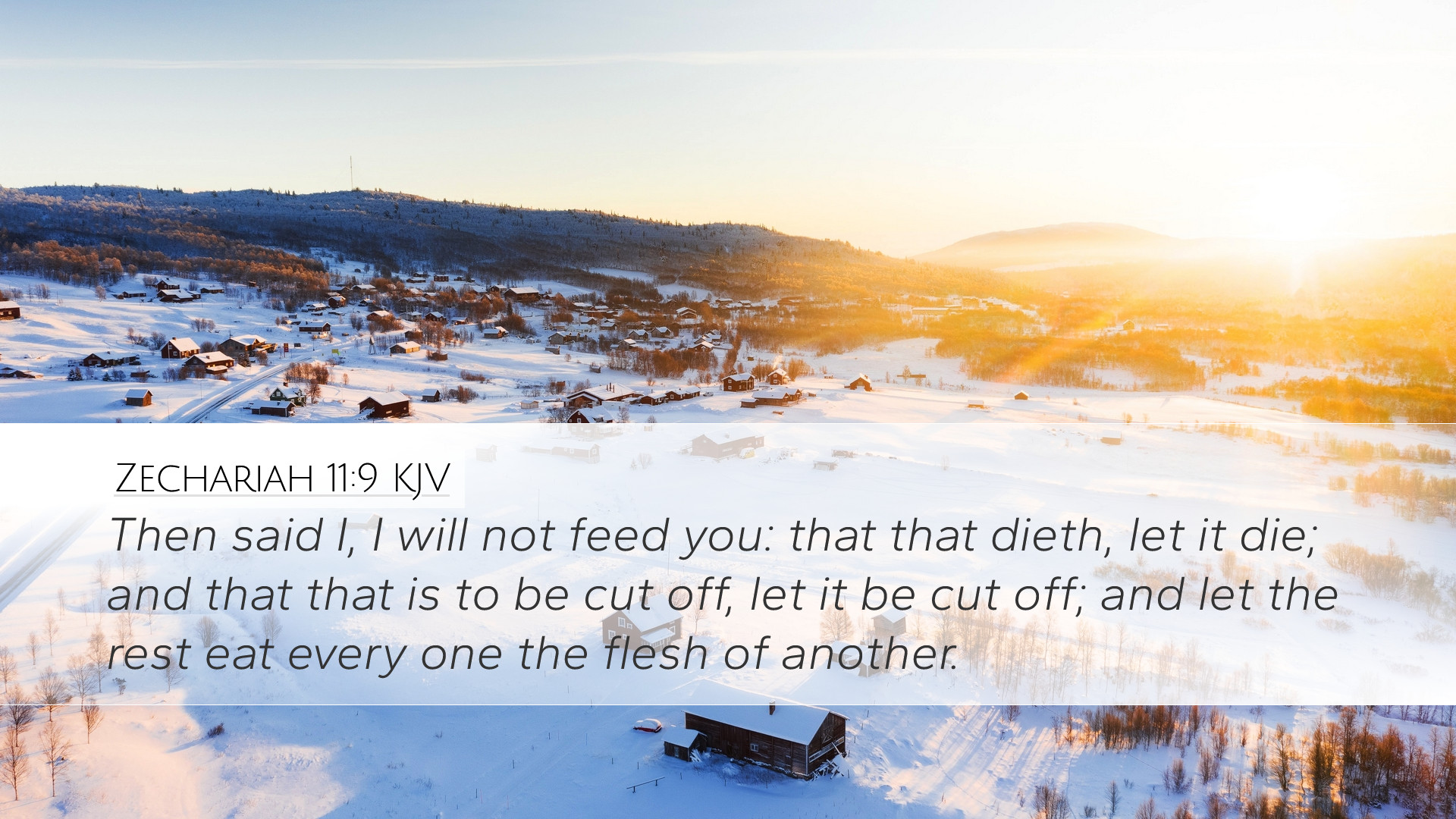Old Testament
Genesis Exodus Leviticus Numbers Deuteronomy Joshua Judges Ruth 1 Samuel 2 Samuel 1 Kings 2 Kings 1 Chronicles 2 Chronicles Ezra Nehemiah Esther Job Psalms Proverbs Ecclesiastes Song of Solomon Isaiah Jeremiah Lamentations Ezekiel Daniel Hosea Joel Amos Obadiah Jonah Micah Nahum Habakkuk Zephaniah Haggai Zechariah MalachiZechariah 11:9
Zechariah 11:9 KJV
Then said I, I will not feed you: that that dieth, let it die; and that that is to be cut off, let it be cut off; and let the rest eat every one the flesh of another.
Zechariah 11:9 Bible Commentary
Commentary on Zechariah 11:9
Zechariah 11:9 states: "Then said I, I will not feed you: that which dieth, let it die; and that which is to be cut off, let it be cut off; and let the rest eat every one the flesh of another." This verse encapsulates a profound thematic message about abandonment, judgment, and the dire consequences of spiritual neglect. In this commentary, insights from public domain sources will be synthesized to elucidate the depths of this verse.
Contextual Background
The prophetic book of Zechariah is set against the backdrop of the post-exilic community of Judah. After returning from Babylonian captivity, the Jews faced challenges in reestablishing their identity and faith. Zechariah, as a prophet, offers both encouragement and admonition, focusing on the future restoration of Israel and the coming of the Messiah.
Exegesis and Themes
Refusal to Feed the Flock
In this passage, the speaker, representing God or a prophetic figure, declares a cessation of pastoral care for the flock. Matthew Henry notes that this reflects a divine decision to withdraw protection and provision. The phrase, "I will not feed you," symbolizes a larger spiritual abandonment, indicating that the leaders and people were unworthy of divine guidance due to their persistent disobedience and lack of true repentance.
Consequences of Division
Continuing from Henry, the verse highlights the dire consequences arising from the disintegration of the community. When the shepherds fail to care for the flock, chaos ensues. Adam Clarke emphasizes this, indicating that neglect and poor leadership lead to strife among the people—the very thing implied by "let the rest eat every one the flesh of another." Here, the imagery evokes cannibalism, a metaphor for destructive relationships that arise from selfishness and internal conflict.
Judgment and Separation
Albert Barnes provides a further analysis, acknowledging that God's refusal to provide for the flock signifies impending judgment. The choice of some to "die" while others are "cut off" portrays the separation between those who are faithful and those who are not. This judgment embodies the principle that God ultimately allows for the natural consequences of individual actions to manifest in communities—the righteous and the wicked will face distinction.
Theological Implications
God's Sovereignty in Judgment
This verse accentuates God’s sovereignty over spiritual, moral, and social matters. Henry’s reflections offer a sobering reminder that God's patience has limits. The withdrawal of support serves as a critical warning for congregations and leaders today about their responsibilities towards their flocks.
Theological Reflection on Leadership
Spiritual leaders are summoned to a higher standard of accountability. With the admission that refusal to lead properly leads to dismemberment within the community, Clarke argues for a holistic understanding of shepherd leadership, suggesting the need for genuine care and sacrificial love in order to cultivate a healthy spiritual environment. Without this, conflict and confusion dominate.
Contemporary Application
For modern pastors and theologians, Zechariah 11:9 serves as a profound reminder of the consequences of neglecting spiritual duties. It challenges leaders to examine their own lives and ministries, and to ensure that their actions align with divine purpose. It also cautions against the dangers of becoming complacent in faith communities when the Spirit's guidance is dismissed.
Conclusion
In summation, Zechariah 11:9 serves as a poignant warning of the consequences of spiritual neglect and the abandonment of pastoral duty. Through the insights of Matthew Henry, Albert Barnes, and Adam Clarke, we gain a comprehensive understanding that this verse speaks not merely to historical Israel, but also resonates profoundly in the contemporary context. It calls each leader, student, and scholar to heed the dire warnings of unfaithfulness and the subsequent fracturing of community when divine oversight is ignored.
May we approach this text with humility and a readiness to learn from the mistakes of the past, fostering a commitment to uphold the core tenets of our faith and the health of our communities.


